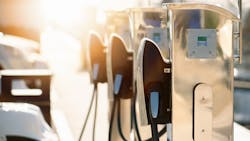What Consumers Want from Beneficial Electrification
Electrification is increasingly gaining attention as utilities and policymakers look to address climate change and decarbonize the economy. In recent months, utilities have announced initiatives around electric buses, all-electric homes, fleet and personal electric vehicles (EVs), and more.
Given the growing importance of this area, the Smart Energy Consumer Collaborative (SECC) commissioned a survey of 1200 Americans to investigate consumer interest in transitioning to electric transportation, space heating, cooking, and water heating. This study examined barriers that might stand in the way of this transition, how consumers view the role of utilities in facilitating this transition, and what messaging might encourage action from consumers.
Based on the Beneficial Electrification: The Voice of the Consumer study, here are three important takeaways on what residential consumers want from beneficial electrification:
1. Consumers are very supportive of electric transportation infrastructure.
Perhaps the most remarkable finding is consumers' widespread support of transportation electrification, including EV charging stations, electric public transportation, and electric school buses. In the online survey, consumers were asked to rate the importance of these types of investments on a scale of 'very unimportant' to 'very important.' Respondents were asked about the importance of government and utility investments separately.
The survey revealed that consumers find these investments important at surprisingly high levels. More than two-thirds (68%) of all consumers believe it is very or somewhat important for the government to invest in EV charging stations, and the same percentage would like utilities to invest in EV charging. This number is much higher than the percentage of people who would likely purchase an EV for their next car. This suggests that consumers believe these investments are important for the future of our society.
Consumers are also supportive of investments in the electrification of public transportation and municipal fleet vehicles at high levels; 61% believe it is important for the government to invest in electric public transportation, and the same percentage supports government investments in electric municipal vehicles. While electric school buses were the lowest of any investment tested, over half of all consumers still believe it is important to make this investment.
2. A price differential does not significantly deter the most interested consumers.
The study investigated the impact of a cost differential on whether consumers would purchase an EV, water heater, cooking range, or home heating system. Eco-conscious and tech-savvy consumer segments are expectedly the most interested in switching when there's no cost differential, although middle-of-the road consumers demonstrate considerable interest in electric hot water and space heating (21% and 24%, respectively).
It's no surprise that adding a 10% cost increase lessens consumers' willingness to purchase them. However, the impact is far from universal. Middle-of-the-road consumers, for example, are severely impacted by a price increase. 21% would buy an electric water heater if the price is the same; but only 7% are interested with the price increase.
Eco-conscious and tech-savvy consumers, on the other hand, are steadfast in their willingness to make these purchases, suggesting that these segments are motivated more by their core values of sustainability and an affinity for technology. For eco-conscious consumers, willingness to purchase an EV or plug-in hybrid only drops from 51% to 47% with a 10% increase in cost, and willingness drops from 41% to 37% for tech-savvy consumers. For both segments, willingness to purchase an electric water heater drops only five percentage points with a price increase.
3. Consumers' top barriers to residential electrification are mostly cost related.
Consumers that were not interested in switching to electricity for water heating, cooking, space heating, and other tools were asked to select their top reasons. These insights would be helpful to stakeholders as they design programs and educational initiatives to maximize consumer education and engagement.
For both electric space and water heating, the top barrier — by a considerable margin — is the belief that fossil fuel-powered heaters are less expensive. While this may be the case in some areas, heat pumps, for example, can be much cheaper to operate. In addition, time-varying rates, smart thermostats, and demand response programs may further decrease the cost to operate electric space heaters and water heaters. For these technologies, stakeholders can provide cost estimate calculators, bill simulators, and other tools to make the financial comparisons more transparent and understandable. Rebates can also help mitigate upfront costs.
For electric cooking, functionality — not cost — is the top barrier for consumers. 42% of those not interested stated that they dislike using electricity to cook and that they have better control with gas. Since there are improved control benefits with electric induction cooking, stakeholders can introduce consumers to this technology through live demonstrations and educational materials that clearly lay out its benefits.
Consumers are supportive of an electric future
According to the SECC's nationally representative survey, Americans are generally supportive of a transition from fossil fuels to electricity for transportation and residential applications. As utilities and policymakers pursue electrification as a means to address climate change, they will likely find many consumers engaged and supportive participants in these efforts. There are barriers that need to be addressed, but these can be easily overcome if stakeholders begin by listening to consumer needs and wants.
About the Author
Patty Durand
Patty Durand is president and CEO at Smart Energy Consumer Collaborative (SECC).
